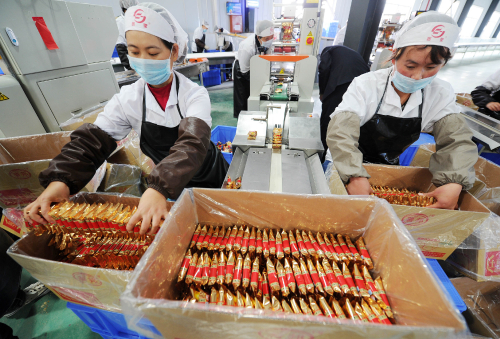|
 |
|
SNACK ATTACK: Workers pack snacks made from potato in a workshop of Guosheng Food Co. Ltd. in Xiji, Ningxia Hui Autonomous Region. In recent years, potato processing has greatly boosted the income of local farmers (PENG ZHAOZHI) |
Wang Peilun, a researcher with the Academy of Agricultural Sciences of east China's Shandong Province, said that the dry-matter yield of potatoes can be higher than that of maize and wheat. In Shandong, the yield of the most productive field was 12,000 kg per hectare in 2014, while the unit dry-matter yield of potatoes can go beyond 15,000 kg, he said.
"The potato can survive cold weather, droughts and barren environments. It has great potential to be planted in fallow fields in China's southern area during winter," Yu said.
The potato can also be grown in places unsuitable for wheat and corn, such as northwestern arid and semi-arid regions.
Yu said that China is going to expand the acreage of potatoes from the current 5 million hectares to 10 million hectares, without crowding out any wheat, rice and maize.
After being labeled a staple food, potato growers will enjoy more policy incentives, while researchers will also be given more funds to develop new species of the crop, an expert with the CAAS told The Beijing News.
Healthy diet
Statistically, the potato has always been counted as a stable food in China, said Pan Wenbo, Deputy Director of the Department of Crop Production in the Ministry of Agriculture. He said that the ministry encourages people to consume potatoes as a staple rather than just as a vegetable not only to increase grain security, but also to improve people's diet.
"The potato is rich in a wide range of nutrients, including high-quality protein, while being low in fat, so it is good for weight control and can prevent diseases in the digestive system. Processing potato into ready-to-consume staple foods or other products can make it more convenient for people with a fast-paced lifestyle to consume," he said.
If we replace some rice in our bowl with potato, we are going to get more nutrients, including balanced amino acids, easy-to-absorb protein, and a good deal of potassium, vitamin C and B1, which are absent in rice, said Fan Zhihong, an associate professor at the College of Food Science and Nutritional Engineering of China Agricultural University.
"A potato contains as much potassium as a banana and as much Vitamin C as a tomato," she said.
Yet many people in China are not aware of the humble potato's nutritious value. Due to this lack of public awareness and traditional dietary habit, the potato has not organically become a staple food in Chinese people's meals, Pan said.
Each year, Chinese people consume 40 kg of potatoes per capita, much lower than Russia's 131 kg and the UK's 102 kg per capita, according to FAO's statistics released in 2008, the International Year of the Potato.
A Beijinger surnamed Liu said that she usually chooses cucumber and tomatoes over potatoes because peeling potatoes is time-consuming, and she prefers the taste of sweet potatoes to that of white potatoes.
After news about the government's effort to promote potatoes as a staple food broke, no visible change in potato sales could be detected at the Jingkelong superstore in Xisanqi neighborhood of Beijing's Haidian District.
Potatoes are usually priced at 2-4 yuan ($0.32-0.64) per kg in the supermarket. A hot seller in the supermarket in winter is Chinese cabbage, sold at a discounted price of 0.56 yuan ($0.1) per kg every morning.
Yu said that the potato is mainly consumed fresh as a non-staple food owing to a lack of species of the vegetable suiting Chinese people's tastes, and lack of technology to process it into Chinese staple foods.
The potato does not contain gluten, so it is difficult to keep potato buns in the right shape and prevent potato noodles from being broken or dissolved in water, said Dai Xiaofeng, head of the Institute of Agro-Products Processing Science and Technology under the CAAS.
He said that the CAAS has successfully developed steamed buns containing 40-percent potato flour and noodles with 35-percent potato flour, which are ready to be sold at supermarkets. He said that wheat flour mixed with the right proportion of potato flour will also be put into market so that people can make potato buns and noodles at home.
Email us at: wanghairong@bjreview.com | 